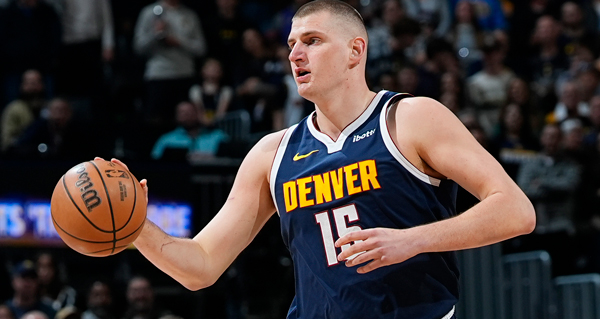The current NBA era of infinite space, no limit three-point variance and the extinction of the classic point guard distributor at the hands of heliocentric gods has been staved off both stylistically and in the form of championships and regular awards by Nikole Jokic and the Denver Nuggets.
Jokic’s eyes dart around impatiently. His head defaults to a 45 degree tilt while his shoulders move in a jerky, effortful way as he saunters around the court without the ball. His pace is always his own. When he spots a potential edge that necessitates speed, his takeoff is telegraphed. Jokic looks like all trunk on television, but is strikingly fitter and leaner in person. His pirouettes and one foot jumps all bely his size. His balance, hands, eyes and mind are consistently in sync. Plop him in the middle of the halfcourt and there are circular options all around him.
Is his brain quiet or loud?
Is he antiquarian with his democratization of the ball when acting as a point guard? Is he also antiquarian by frequently going to work in the post like a traditional big? Or is he from the future where every team will invert the floor with the tallest, biggest guy running the offense from the perimeter to see every read, make every feint to deceive the defense, and possess all the angles to get the ball on target while also offering the ancillary benefit of clearing out space at the rim?
Jokic is decidedly pragmatic despite his level of autonomy. Jokic’s guiding principle is simply seeking out the easiest points possible. Jokic seems to do this instinctively and not out of a statistically fueled ruthlessness. He won’t do the extra credit. He won’t grift. He is a workaday craftsman who elicits more admiration and respect than imagination. The Nuggets get the same easy points every modern offense seeks out, but the process is different. It also cannot be copied.
Jokic does not appear obsessive or particularly ambitious. Whether or not that is actually true, Jokic certainly lacks any degree of self-promotion. Nothing feels performative. Novak Djokovic embraced the villain role against the universal love offered to Roger Federer and Rafael Nadal, but he did eventually seek out adulation as they retired and faded when he was the only one still standing.
It was once a radical notion that Jokic would be capable of leading a team to a title due to the expectations of a center on defense and his disadvantages there. He has had to be just that comprehensively good on offense plus better than reputation on defense. He makes everyone around him better and there is a cohesion to his teams on and off the court.
The team building around Jokic is sustainable, which will give the Nuggets an extended window for more titles that will also allow him to climb the all-time great list. Jokic only has Hakeem Olajuwon to pass to become the greatest non-American born player of all-time though that’s predicated on outpacing his contemporary two months older than him in Giannis Antetokounmpo.
Jamal Murray is essentially a superstar on a discount due to a run of injuries preventing him from qualifying for the supermax. Aaron Gordon took a discount on his extension and is an overqualified do-everything role player. Michael Porter Jr. will likely leave some money on the table for his next extension considering his injury history and where he’s settled in as a designated scorer. Calvin Booth has sent a clear signal he will target cheap play-now role players in the draft.
The Nuggets rank last in the NBA in three-point rate and don’t often blowout their opponent, hence the rather ordinary net rating, but no team will outexecute them in close games. The Celtics, who are their most likely opponent in The Finals, are on the opposite end of the spectrum with their three-point reliance and late game feebleness. Jokic is idiosyncratically inventive yet also consistent and eminently reliable. The best way to defend Jokic is to make him more of a scorer, not because it is more effective but because it is more likely to annoy him.
Jokic seems to prefer to pass his way to an easy shot, but he possesses a nearly unstoppable shot diet that vacillates between putting his skinnier defender into the basket or receiving the ball on the perimeter for a wide open post-rotation three-pointer with his quirky, unblockable release behind his buzz cut. If all else fails, he will maraud off the dribble into the paint for a teardrop with the softest touch in the league.
Except when you expect his floater, he instead will give you what has become the trademark play of his career: the shot lob where he appears to be attempting a shot, but the ball magically drifts just to the edge of the rim for an alley-oop, usually to Aaron Gordon.
Is his brain quiet or loud? When does he know which option he’ll choose? Does he even choose it or does it just instinctively happen?
Lionel Messi’s mind appears similarly placid with his genius. The mind is zen. Great passers notice things other do not with the extra space in their mind. They are not distracted. Messi thrived in Barcelona’s tiki taka with short, frequent passes, which Jokic also approximates with his volleyball touch passes, water polo passes, behind the head passes and even the pedestrian passes. Jokic leads the NBA in touches with over 100 per game. He never holds on too long. The ball continues to move. His teammates don’t have to tolerate him.
The other passer from another sport is Patrick Mahomes, both in terms of unflappability in the biggest moments, but also his pure inventiveness in improvisational moments. The most impossible passes are reflexive in the fastest of moments. If the angle isn’t there, Mahomes will create the angle. The mind of Jokic, Messi and Mahomes is never in crisis. It is not preoccupied with legacies.
None of the three were ever supposed to be this good. Mahomes was thought to be too erratic and couldn’t play within structure. Messi had a growth hormone deficiency. Jokic needed to stop drinking three liters of soda every day.
The Nuggets feel overwhelmingly inevitable to repeat as champions and this comes after they beat three play-in teams and an injured Suns team to win the title last season. There were far more doubts about the Warriors after their first title in 2015 than these Nuggets. Golden State responded by winning 73 and then coming back from 3-1 down against the Thunder and blowing their own 3-1 lead against the Cavaliers. There is a muted confidence that nobody has an answer for Jokic when it matters most.
The 2016 Rookie of the Year voting is a fascinating time capsule of where we thought the center position was going at the time. Jokic finished third behind Karl-Anthony Towns and Kristaps Porzingis and immediately ahead of Devin Booker and Jahlil Okafor. Towns and Porzingis were the transformational unicorns to reinvent the center position as three-point shooters on offense and rim protectors on defense. Towns quickly abandoned any notion of anchoring a defense and that led to the Rudy Gobert trade. Porzingis was injured and told to abandon his post game to simply stand in the corner before finding his way to the Celtics where his shooting, post play and defense fits perfectly as a third option. They have both largely delivered on what was conceptually expected, but obviously neither is a transcendent superstar like Jokic. Like every all-time great, Jokic is too special to be a prototype.
Jokic will always be likable, but he will never be widely considered loved or hated. He won’t incite a rivalry. He won’t say anything particularly interesting. He’ll be purposely boring, but not as a contrivance. Jokic is entertaining, but he isn’t an entertainer. He will continue to be as withdrawn from so much of the NBA he finds onerous until he’s ready to stop sloshing around the court nine months out of the year. He won’t have a prolonged post-prime decline where he still plays despite being severely diminished. He will return to Serbia and you will may never see him again. He will be unknowable.
Will he ever think about any of this again?



